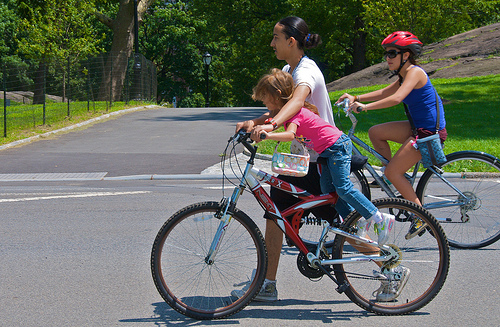Upper West Side residents want to make Central Park once again a welcoming place for recreational cyclists, based on the near-unanimous position of Community Board 7's parks and transportation committees at a joint meeting last night. But with the NYPD intransigently committed to its ticketing blitz and DOT unwilling to pay for changes to the traffic signals in the park, it's not clear how to move forward. Some bright news is on the horizon for cyclists hoping to use Central Park for transportation, however: Two east-west routes through the northern end of the park should open this summer.
As of mid-March, the Central Park Precinct had handed out 230 tickets to cyclists in 2011. In comparison, they issued only 160 speeding tickets to motor vehicle drivers in all of 2010. The members of the two committees all agreed that the crackdown was negatively affecting Central Park. The central concern of the discussion, as presented by parks committee co-chair Klari Neuwelt, is that "there seems to have been a substantial decrease in the number of cyclists using Central Park for exercise."
The NYPD's new bike enforcement policy was uniformly perceived as excessive. Transportation committee co-chair Dan Zweig voiced the least critical view, thanking police for enforcing traffic laws against cyclists but adding, "I wish they had picked a better place than Central Park to start doing it."
The widespread agreement, however, didn't extend to the question of how to best facilitate cycling during car-free hours. The problem is that there isn't an easy fix within reach.
The simplest solution would be for the police to return to the former status quo and stop making cyclists running red lights a top priority. Unfortunately, said Neuwelt, "we came to a dead end in that discussion. We've got nowhere to go with the police."
If you can't change the way the law is enforced, the community board thought next, change the law itself. The most popular position seemed to be a plan to change the lights to blinking yellows during off-peak hours, with push-buttons for pedestrians to request a red light if needed. "That's the answer," said transportation committee co-chair Andrew Albert. "Don't stop if there's nobody there."
City Council Member Ydanis Rodriguez introduced legislation last week that would require traffic lights in parks to be blinking yellows during car-free hours. It currently has the support of Council members Gale Brewer, Vincent Gentile, and Brad Lander.
Blinking yellows, however, also are opposed by the city. According to Neuwelt, DOT thinks that blinking yellows would be too dangerous for pedestrians and, given the old traffic signal technology in the park, be prohibitively expensive.
Community members presented other ideas as well, each with its own set of drawbacks. Board member Suzanne Robotti, for example, proposed retiming the traffic lights to the speed of cyclists rather than cars as a way of allowing cyclists to ride without stopping while still keeping red lights so pedestrians can cross. There was a lot of enthusiasm for the concept until it was pointed out that cyclists travel at very different speeds.
Similarly, Upper West Side resident Jim Zisfein's proposal to add signage urging cyclists to stop for pedestrians ran into questions about what would happen when the signs' instructions conflicted with the message of a red or green light.
Ultimately, the community board did not endorse any specific plan. Instead, the next step will be a meeting of all the stakeholders organized by Council Member Gale Brewer, who was in attendance at last night's meeting.
More concrete progress was announce on plans to allow cyclists to cross the park from east to west. The Central Park Conservancy's Caroline Greenleaf announced that the first two crosstown routes would be open early this summer: one along roughly 102nd Street and one along 96th. The park is still working with DOT on configuring the entrances and exits for the 102nd Street path.
"If these two paths turn out to work well for everybody," said Greenleaf, "we're looking to expand them southwards." One future location would go along the north side of the Great Lawn, at roughly 86th Street. Below that, it's not clear where any additional routes would go. Higher pedestrian volumes at the southern end of the park and automobile traffic along 72nd Street present challenges, according to Greenleaf.
The paths are likely to have strict rules limiting bicycles. "There will be some sort of speed limit," said Greenleaf, likely either 5 miles per hour or "walking speed." "These paths are so heavily used," she explained.
The community board did not offer a formal resolution on the east-west bike routes, but seemed very supportive. Board members uniformly spent their time suggesting possible low-conflict routes for the southern end of the park, not critiquing the proposal.






